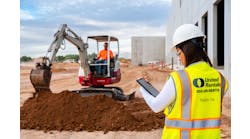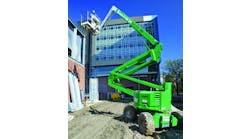Washington Air Compressor Rental, the subject of this month's cover story, may be the oldest existing equipment rental company doing rentals continually — 77 years and counting. I know of equipment dealerships that are older, but they haven't been in the rental business that long. I know of rental companies that started around that time, but have since been acquired and no longer exist under their original name, although some of their locations might still be around as rental centers. If anybody out there is older at rental, let us know!
But Washington Air may have a unique claim to being the oldest, and what's more, it's still in the same family. Like other rental companies of its approximate vintage, it got into the rental business by accident as our story explains.
What impressed me about this five-location company and its management team is their interest in growing and taking the company to the next level. I got no indication that the Stecklein brothers were satisfied to just let things roll along. Their grandfather, Albert Stecklein, who founded the company, was an original entrepreneur who saw potential in a business none of his peers had really even heard of. Their father, Albert Jr., was and still is a dedicated high-energy individual, still involved in growing the company well into his 70s.
Steve, Brian and Kevin Stecklein know that for the company to continue to be successful, it must grow; it must take on new equipment lines, extend its geographic reach, and certainly not stand still in the scope of its service.
While driving to visit Washington Air branches with Danny Bowling, general manager of operations and vice president of new equipment sales, he told me he is trying to figure out what customer service really means. Bowling is no newcomer to the industry, having worked for Sunbelt Rentals and then a Bobcat dealership, and well understands the essential commitments a rental company must make to its customers. What interests Bowling is figuring out how to take it to a higher level.
When Bowling hears rental companies tout their customer service as delivering equipment on time and making sure breakdowns are handled in an expedient manner, his response is, “Isn't that what we're supposed to do?” Isn't being on time the basic minimum that anybody in business should do?
Bowling compares it to a supermarket. When a customer goes shopping for food, he expects that the can of tuna he wants is going to be there, that's the essential minimum. The supermarket doesn't need to boast that it has the products its customers want — if it didn't, it wouldn't be in business. Likewise, does it have to boast that when the customer is ready to check out, the cashiers are on their jobs and ready to go?
In most businesses, being on time is essential, not something exceptional. Delivering equipment on time should be a given. Not being able to deliver on time should be a noticeable failure on the part of the rental company; the exception, not the norm. Quick response to breakdowns the same; failure to respond with urgency should be regarded as absolutely unacceptable.
Bowling is more interested in figuring out why a machine broke down to begin with. Breakdowns occur on construction sites, obviously, but figuring out how to minimize them should be a major priority for all rental companies that are serious about being in this business long term.
Not only is Washington Air Compressor impressive for its survival and commitment to growth and improvement, but its history is fascinating as well. Its founder saw an opportunity to try a side business, renting air compressors, but had no way to transport the large machines. Like many founders and entrepreneurs in the rental business and among manufacturers, Stecklein was a mechanic and a tinkerer self-reliant enough to figure out how to mount the air compressors on the back of Coca-Cola trucks. Historical research shows he wasn't the first to have mounted an air compressor on a truck, but those inventors were few and far apart and probably not aware of one another.
In tough times such as the ones we live in, inventing solutions to a problem is the kind of ingenuity many of us will need to survive, whether it be a mechanical solution, a business solution, a software solution, a unique marketing approach or whatever. There can be as many kinds of ingenuity as there are people.
Some companies will survive this downturn by resolutely sticking to what they do well. However for others, innovation will be critical. We'll find out a lot in the coming year.





